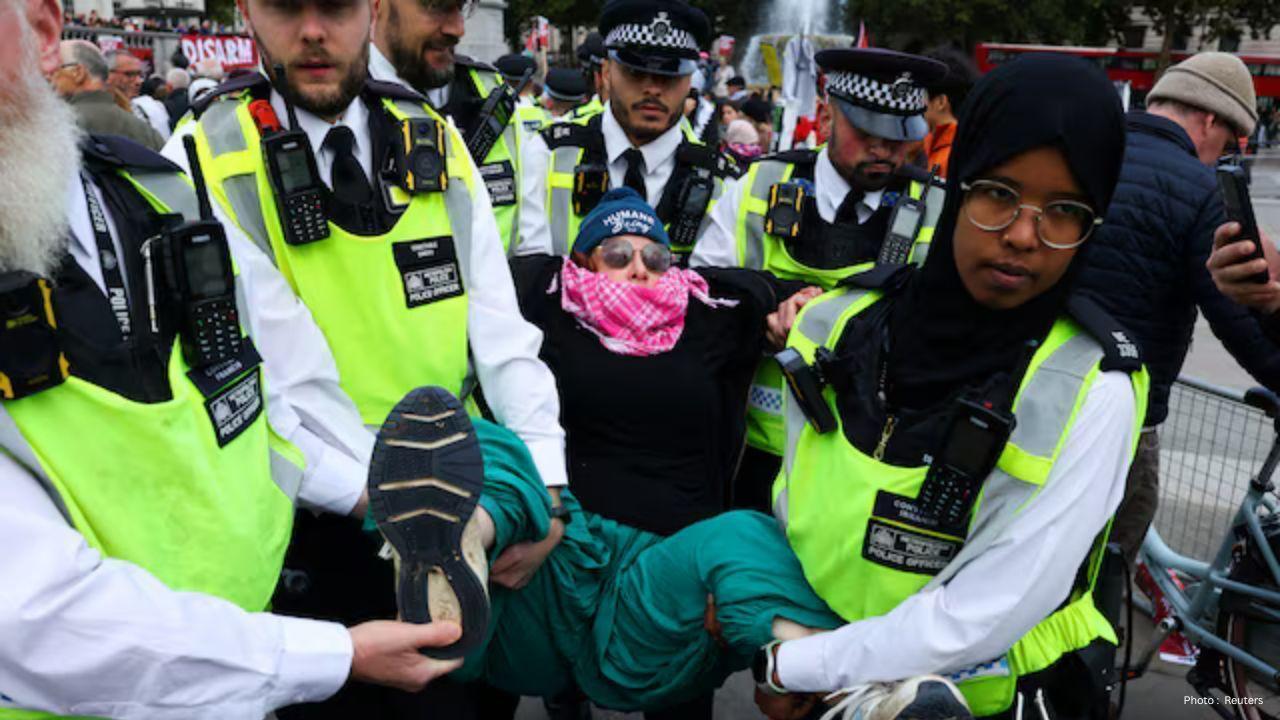
Post by : Saif Ali Khan
The British government has lost an important legal fight to stop a challenge against its decision to ban the pro-Palestinian group, Palestine Action. The co-founder of the group, Huda Ammori, will now be allowed to take her case to the High Court next month.
Background of the Ban
Palestine Action, created in 2020, was banned in July 2025 under Britain’s anti-terrorism laws. The ban makes it illegal to be a member of the group. Anyone found breaking the law could face up to 14 years in prison. Since the ban, more than 1,000 people have been arrested for supporting the group, and over 100 have been formally charged.
The government decided to proscribe the group after it carried out protests against companies linked to Israel, including the Israeli defence firm Elbit Systems. These protests involved spraying red paint, blocking entrances, and damaging equipment. Some members even broke into RAF Brize Norton air base and damaged two planes. Four of them have been charged in connection with that incident.
The Legal Challenge
Huda Ammori, who co-founded Palestine Action, applied to challenge the ban in court. The Home Office, Britain’s interior ministry, asked the Court of Appeal to stop her case and said that any challenge should only go through a specialist tribunal.
Judge Sue Carr rejected this appeal. She ruled that Ammori’s case can proceed in the High Court. This is seen as a significant decision, allowing legal review of the government’s power to ban organizations under anti-terrorism laws.
What the Group Says
Before it was banned, Palestine Action had said it was targeting companies linked to Israel because it wanted to protest what it called Israeli war crimes in Gaza. The group claimed Britain was supporting these actions by allowing such companies to operate.
The group’s protests, however, often broke the law, which was a major reason the government decided to classify it as a terrorist organization.
Impact of the Decision
This court ruling is important because it allows the High Court to examine whether the government acted correctly in banning Palestine Action. It could also set a precedent for other cases where the government bans groups under anti-terrorism laws.
The case will test the balance between national security and freedom of speech in Britain. Human rights organizations will likely follow it closely, as it may affect how protests and political activism are handled in the future.
The British government faces a legal challenge that could shape how anti-terrorism laws are applied in the country. Huda Ammori’s case highlights the tension between state security and civil rights, showing that even when groups are banned, their members still have the right to question government decisions in court.










Baaghi 4 starring Tiger Shroff now streams on Amazon Prime Video
Tiger Shroff’s Baaghi 4 hits Amazon Prime Video on a rental basis, bringing high-octane action and e

Dubai Basketball Club stuns Barcelona with historic 83-78 win
Dubai Basketball Club beats EuroLeague champs Barcelona 83-78 in historic debut at Coca-Cola Arena,

Lazio Denies Qatari Sale Rumors, Files Legal Complaints
Lazio refutes online claims of Qatari takeover talks, files reports with Italian regulators and judi

Penn State Fires Coach Franklin After Third Straight Loss
Penn State parts ways with James Franklin after 3 conference defeats, naming Terry Smith as interim

Denmark Beats Greece 3-1 to Stay Top in Qualifiers
Denmark wins 3-1 at home over Greece, keeps unbeaten record, and stays ahead of Scotland in Group C

Panthers Edge Cowboys 30-27 with Dowdle’s Big Game
Rico Dowdle dominates former team with 239 total yards as Panthers win 30-27 over Cowboys by last-se